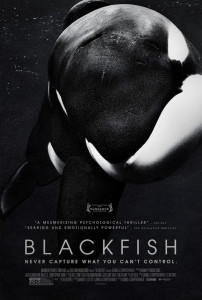 I just finished watching the film Blackfish. It is a very moving documentary about the ethics surrounding the capture of orcas in the wild and their treatment while in captivity. The film takes a close look at the popular park Sea World and their treatment of orcas, more commonly known as “killer whales,” and the resulting tragedies that occur to the trainers of these animals, such as Dawn Brancheau, who was killed by a 12,000-pound killer whale named Tilikum in 2010 at a Sea World park.
I just finished watching the film Blackfish. It is a very moving documentary about the ethics surrounding the capture of orcas in the wild and their treatment while in captivity. The film takes a close look at the popular park Sea World and their treatment of orcas, more commonly known as “killer whales,” and the resulting tragedies that occur to the trainers of these animals, such as Dawn Brancheau, who was killed by a 12,000-pound killer whale named Tilikum in 2010 at a Sea World park.
The film was very moving and superbly done. I really enjoyed it, though at the same time it left me very sad about the treatment of these beautiful, majestic and highly intelligent animals.
The documentary contrasts the environments, life spans, and behavior of orcas in the wild and compares them to those in captivity, and argues that the negative changes seen in captive orcas are a direct result of that captivity. Examples include curled fins, separation from family, and attacks on humans, which do not occur in the wild. Blackfish appears to have an open and shut case that captivity isn’t good for these animals, unlike what the parks often argue, who make millions from parading these animals around as if in a circus.
It has long been my belief that human beings are not a special species on earth that should traipse around the world destroying the habitats of other animals, killing and capturing them for sport or other unethical uses. One such disturbing example I learned a few years ago was that the US military sought to train dolphins and sea lions to seek out sea mines. When I heard about this I immediately objected because I feared these high intelligent dolphins might be blown to bits because of the military’s uncaring program that put these animals at risk (though I have heard that robots would be replacing these animals, which I hope was implemented).
A much more ethical means to put these animals on display would be to contain them in sea pens or sanctuaries where companies could still charge for people to come watch these animals, but at the same time ensure they are better cared for in a more natural environment with their families. With this more ethical option available, which doesn’t threaten their profits, there is no reason at all to treat these animals in this manner.
I urge all people to watch this film. I think it has the potential to change the way people view marine parks like Sea World.
As a side note, for my skeptical readers Donald Prothero reviewed the film Blackfish in the November 2013 issue of Skeptic magazine, Vol. 18 No. 4 2013. Rest assured. For those who are not subscribers to Skeptic you can find this article for free at skeptic.com.
